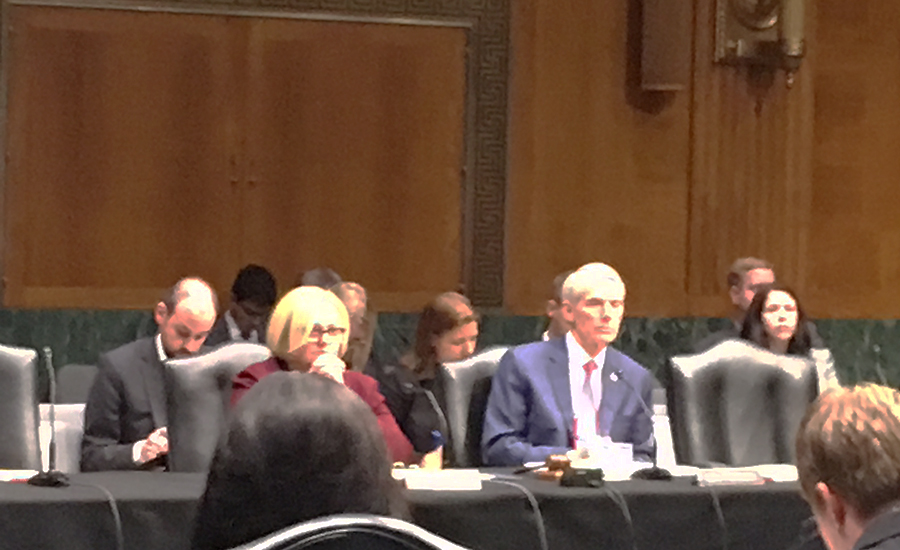A low-profile federal council charged with accelerating the federal environmental approval process for certain types of major infrastructure projects has saved more than $1 billion in delays avoided in its less than three years of existence, the council's acting head says.
Sens. Rob Portman (R-Ohio) and Claire McCaskill (D-Mo.), who spearheaded the 2015 creation of the Federal Permitting Improvement Steering Council, are pleased with the results so far.
But the senators want to go further. They introduced a bill on June 6 that would set a goal of issuing a federal decision on a project permit within two years. The bill also would cancel a provision in the 2015 Fixing America's Surface Transportation, or FAST, Act—which established the permitting council—that would sunset the agency in December 2022.
Their proposal also would broaden the types of projects the council is responsible for. Most of the projects it has worked on have been energy-related, such as electric transmission lines.
Perhaps surprisingly, most Dept. of Transportation projects, including highway, transit, airport and rail, and some Army Corps of Engineers projects, are excluded from the council's purview. Those projects are covered by other statutory provisions that aim to speed up environmental reviews.
The new bill doesn't change the $200-million minimum size threshold for a project to be considered by the council.
The lawmakers highlighted the council at a June 27 Senate roundtable on the subject. (Link to roundtable webcast and speakers prepared statements.) Most of the speakers, who included representatives from the Office of Management and Budget, U.S. Chamber of Commerce and North America's Building Trades Unions, gave the council positive reviews.
Portman said the current federal permitting process "takes too long" and is complicated and bureaucratic. Moreover, he said, "those delays have real costs … in terms of money, in terms of jobs, in terms of safety."
McCaskill said the council's system saves taxpayers money and gets projects in place sooner. "It's a win-win all the way around," she added.
Estimated $1B savings
The senators were pleased to hear the council's acting executive director, Angela Colamaria, report the estimated $1-billion savings over the past 18 months. Portman called the result "awesome."
Colamaria said the $1-billion estimate is derived from project sponsors' figures and related public court filings.
For example, she said that according to the sponsor of the Nexus Gas Transmission pipeline project in Ohio and Michigan, the council aided cooperation among agencies that cut six months from the schedule and saved $300 million in capital costs.
Scott Slesinger, the Natural Resources Defense Council's legislative director, questions how solid the cost-saving number is. The council didn't immediately respond to ENR's request for more details on the estimate.
But he says that overall the council is making progress. "The dashboard is up and running. The [council] is up and operating," Slesinger says. "There seems to be more dialogue on big projects among the agencies and things appear to be moving in a more efficient way."
The FAST Act directs the council to encourage agencies to do their respective reviews simultaneously, not in sequence, and to have one agency take the lead on the environmental review process.
It also calls for a live on-line "dashboard" that maps each project's progress through the approval system. Other sections of the dashboard list review progress for non-council projects, such as those in transportation.
Portman and McCaskill want to see the council's budget enlarged beyond its 2018 appropriation of $1 million. They also would like the White House to name a permanent executive director. Colamaria is acting chief.
NRDC's Slesinger agrees, saying the budget is "ridiculously small." He also supports having President Trump appoint a director.
Slesinger says the council's two acting directors have been "really, really good." But he adds, "if you're going to knock heads together at the deputy secretary level, you need somebody with the political support above them." Under the FAST Act, council participants are at departments' deputy secretary level.
Two-Year goal
The senators' new bill calls for setting a goal of completing federal project reviews within two years—the same timetable that President Trump called for in an August 2017 executive order dealing with infrastructure project reviews.
Trump announced on April 9 that the permitting council and 11 agencies had signed a memorandum of understanding, pledging to cooperate on environmental reviews of projects.
Sean McGarvey, president of the building trades, noted that investors want the predictability of knowing when a project will be completed and start producing a return on investment. McGarvey said that if a two-year goal for a permit decision were implemented, "that would change the whole ballgame."
He also said the building trades themselves plan to step up their direct financial stake in infrastructure projects, noting that over the next 10 years the unions will be shifting about $70 billion from their pension funds into infrastructure and real estate and away from other investments.
Colamaria said there are 38 projects now listed on the dashboard, including 16 that have completed federal permitting. She also said officials have applied to have six new projects added to the council's list, and five have been determined to be under the council's purview.
Slesinger concurs with Portman and McCaskill about removing the sunset provision for the permit council itself, but favors keeping the 2022 date in place for other matters, such as those related to litigation.




Post a comment to this article
Report Abusive Comment